2022届高考英语二轮复习:虚拟语气课件(22张)
文档属性
| 名称 | 2022届高考英语二轮复习:虚拟语气课件(22张) |  | |
| 格式 | ppt | ||
| 文件大小 | 452.0KB | ||
| 资源类型 | 教案 | ||
| 版本资源 | 通用版 | ||
| 科目 | 英语 | ||
| 更新时间 | 2022-02-24 18:44:00 | ||
图片预览

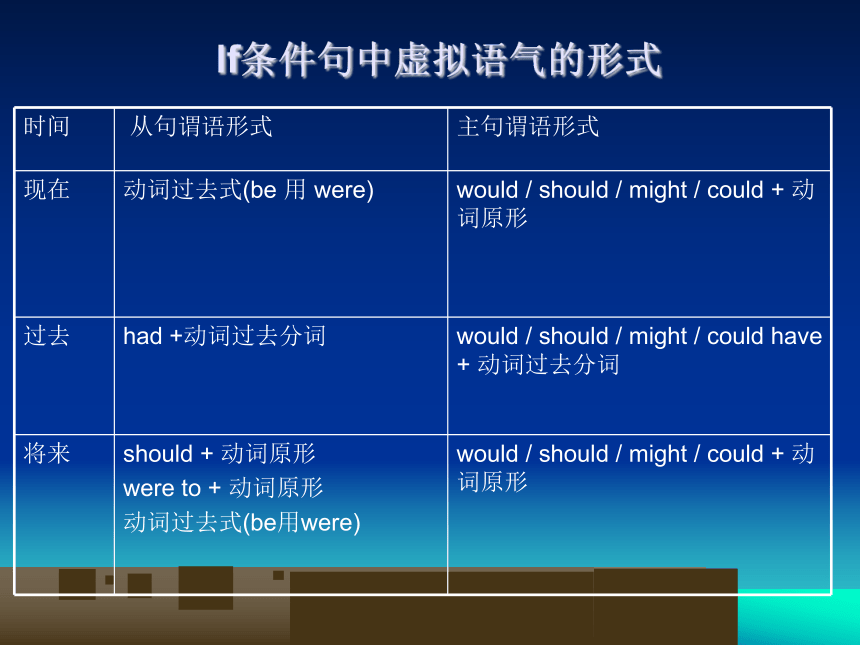
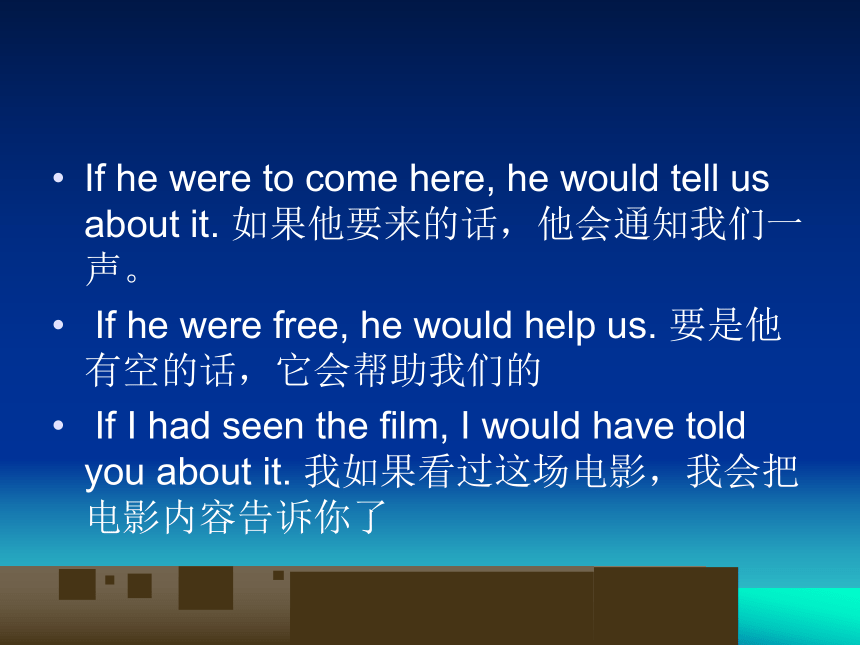
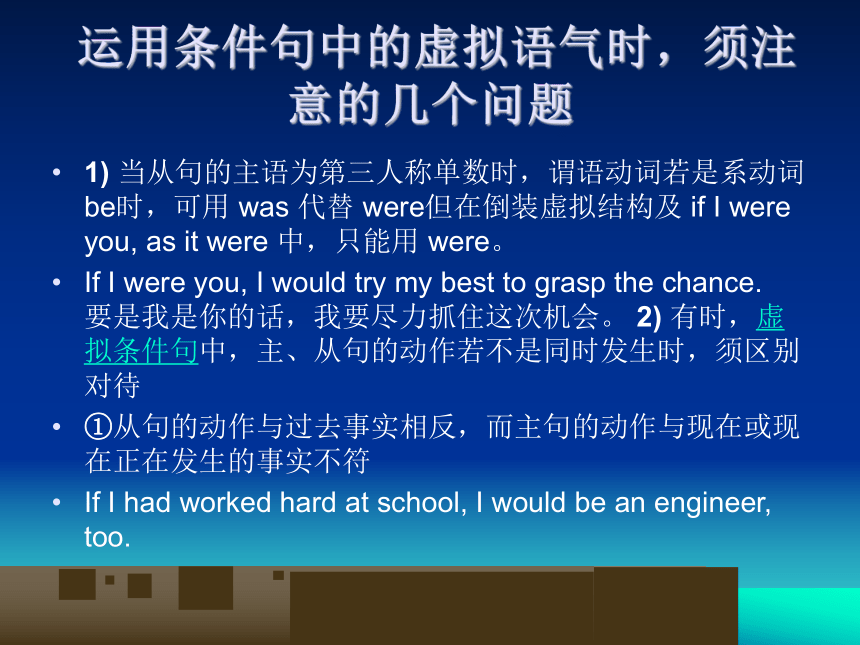
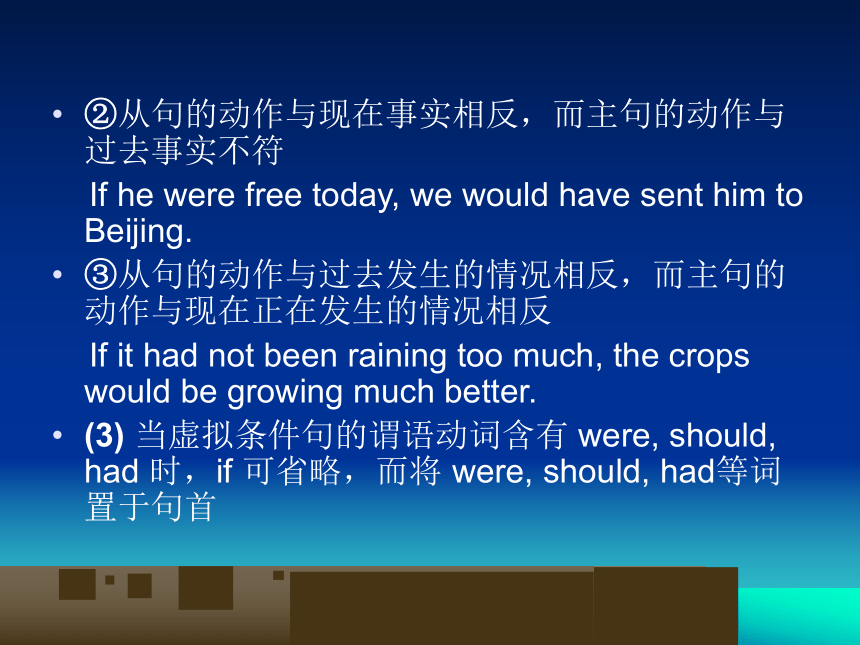
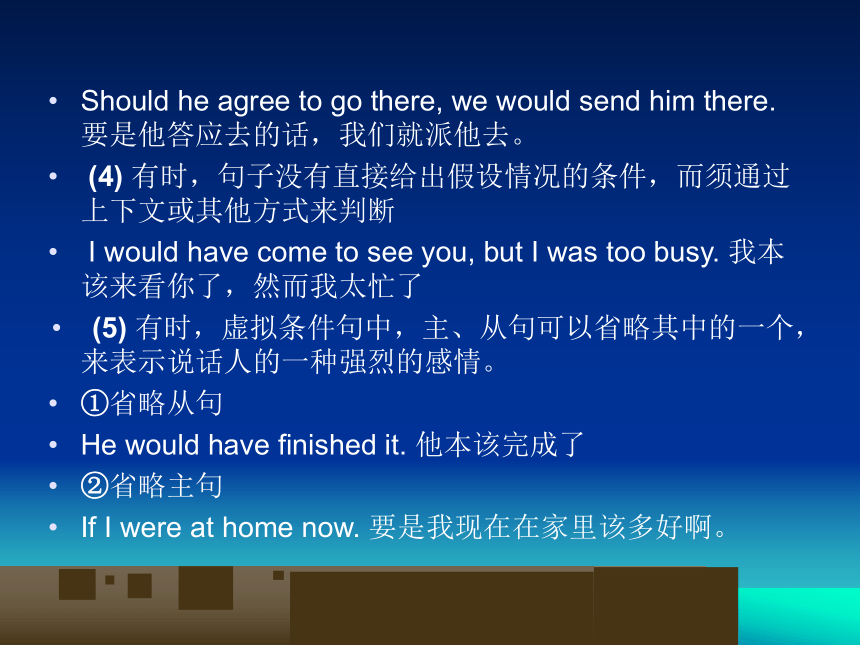
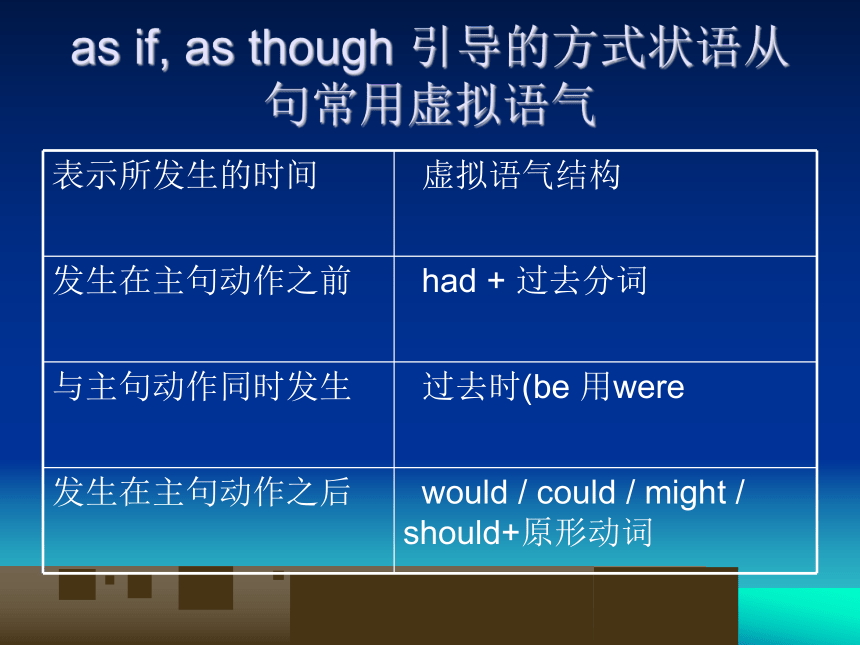

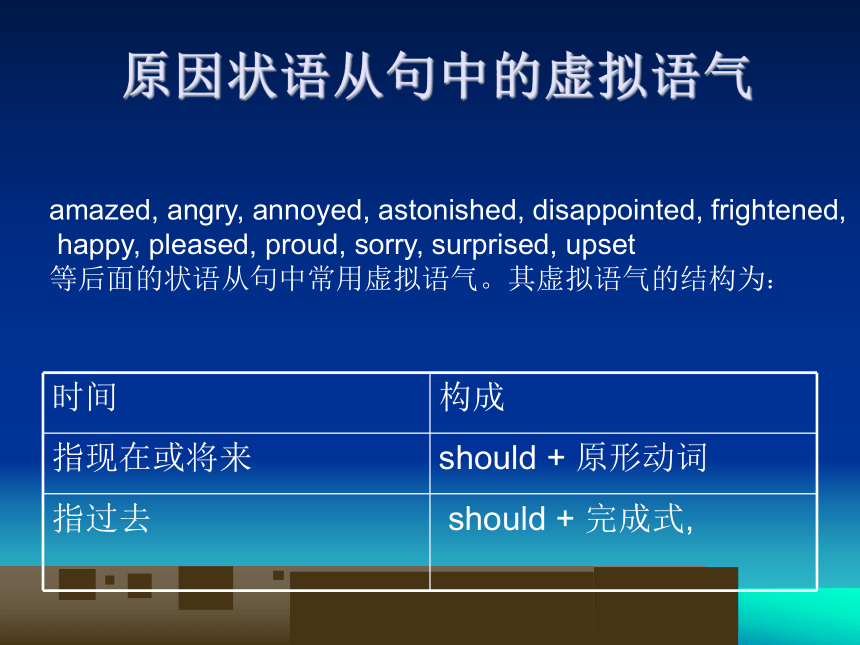
文档简介
(共22张PPT)
虚拟语气
If条件句中虚拟语气的形式
时间 从句谓语形式 主句谓语形式
现在 动词过去式(be 用 were) would / should / might / could + 动词原形
过去 had +动词过去分词 would / should / might / could have + 动词过去分词
将来 should + 动词原形
were to + 动词原形
动词过去式(be用were) would / should / might / could + 动词原形
If he were to come here, he would tell us about it. 如果他要来的话,他会通知我们一声。
If he were free, he would help us. 要是他有空的话,它会帮助我们的
If I had seen the film, I would have told you about it. 我如果看过这场电影,我会把电影内容告诉你了
运用条件句中的虚拟语气时,须注意的几个问题
1) 当从句的主语为第三人称单数时,谓语动词若是系动词be时,可用 was 代替 were但在倒装虚拟结构及 if I were you, as it were 中,只能用 were。
If I were you, I would try my best to grasp the chance. 要是我是你的话,我要尽力抓住这次机会。 2) 有时,虚拟条件句中,主、从句的动作若不是同时发生时,须区别对待
①从句的动作与过去事实相反,而主句的动作与现在或现在正在发生的事实不符
If I had worked hard at school, I would be an engineer, too.
②从句的动作与现在事实相反,而主句的动作与过去事实不符
If he were free today, we would have sent him to Beijing.
③从句的动作与过去发生的情况相反,而主句的动作与现在正在发生的情况相反
If it had not been raining too much, the crops would be growing much better.
(3) 当虚拟条件句的谓语动词含有 were, should, had 时,if 可省略,而将 were, should, had等词置于句首
Should he agree to go there, we would send him there. 要是他答应去的话,我们就派他去。
(4) 有时,句子没有直接给出假设情况的条件,而须通过上下文或其他方式来判断
I would have come to see you, but I was too busy. 我本该来看你了,然而我太忙了
(5) 有时,虚拟条件句中,主、从句可以省略其中的一个,来表示说话人的一种强烈的感情。
①省略从句
He would have finished it. 他本该完成了
②省略主句
If I were at home now. 要是我现在在家里该多好啊。
as if, as though 引导的方式状语从句常用虚拟语气
表示所发生的时间 虚拟语气结构
发生在主句动作之前 had + 过去分词
与主句动作同时发生 过去时(be 用were
发生在主句动作之后 would / could / might / should+原形动词
They began to talk warmly as if they had known each other for long.
他们开始热烈的谈论起来就好像他们已相互认识很久了。
He coughed twice as if someone should come.
他咳嗽两声就好像有人要来了。
原因状语从句中的虚拟语气
时间 构成
指现在或将来 should + 原形动词
指过去
should + 完成式,
amazed, angry, annoyed, astonished, disappointed, frightened,
happy, pleased, proud, sorry, surprised, upset
等后面的状语从句中常用虚拟语气。其虚拟语气的结构为:
① should + 原形动词(指现在或将来)。如:He was angry that you should call him by name.
他很生气,你竟然对他直呼其名。② should + 完成式, 指过去。如:
I’m very sorry that you should have failed the exam. 我很遗憾,你这次考试竟然失败了。
宾语从句中的虚拟语气
1英语中,如:advise, ask, demand, desire, decide, insist(坚决要求) , order, propose, request, suggest(建议) 表示请求、要求、命令或建议等意义的动词所接的宾语从句一般用虚拟语气,其虚拟语气的结构为:(should) + 原形动词。
当insist的意思为:坚决认为,坚持说;suggest的意思为:表明,暗含,暗示等时,宾语从句一般不用虚拟语气
The teacher advised that we should make good use of every minute here. 老师劝我们要好好地利用在这儿的每一分钟。
Tom insisted that he hadn’t stolen the watch. 汤姆坚持说他没有偷那块手表
2. believe, expect, suspect, think, imagine 等动词的否定句或疑问句中的宾语从句常用虚拟语气其虚拟语气的结构为:should + 原形动词。如: Can you believe that he should kill a tiger 你能相信他竟杀死了一只老虎
wish 之后的虚拟语气
时间 虚拟语气结构
发生在主句动作之前
(过去) 用过去完成时或would / could+have +过去分词
I wish I had visited the white House when I was in the states
I wish I had known the truth of the matter
我希望我那时就知道这件事情的真相。(事实:那时还不知道
与主句动作同时发生
(现在) 过去式(be 用were )
I wish I were rich. 要是我现在有钱就好了。
发生在主句动作之后
(将来) would / could / might / should + 原形动词
I wish I should have a chance again.
我希望我还能有一次这样的机会
注意,从句的时态只与从句所指的时间有关,而与 wish 的时态无关。
I wish I were rich. 要是我现在有钱就好了。
I wish I had been rich. 要是那时我有钱就好了。
I wished I were rich. 当时我后悔自己没有钱。
I wished I had been rich. 当时我后悔自己曾经没有钱。
would rather, had rather, would sooner等之后的宾语从句常表示与客观事实不相符的一种愿望,故使用虚拟语气
时间 虚拟语气结构
过去 had + 过去分词
I’d rather you had seen the film yesterday. 我倒想你昨天看过了这场电影
现在 过去时(be 用were )
I’d rather you were here now. 我倒想你现在在这儿
将来 过去时(be 用were )
We’d rather you went here tomorrow. 我么倒想你明天去那儿
主语从句中的虚拟语气
在表达惊异、惋惜、遗憾、理应如此等意义的主语从句中常使用虚拟语气,其虚拟语其的结构为: should + 动词原形,主句中的谓语动词形式不限。
(1) It is admirable / dreadful / extraordinary / odd / remarkable / sad / advisable / annoying / disappointing / surprising / upsetting / frightening / better / best / curious / desirable / important / strange / peculiar / proper / necessary / natural...that...
(2) It is a pity / a shame / no wonder...that...
(3) It is suggested / requested / desired / proposed /... that...
(4) It worries me that...
表语从句及同位语从句中虚拟语气
英语中,表示请求、要求、命令、建议等名词advice, desire, decision, idea, instruction, order, plan, proposal, recommendation, request, requirement, suggestion, wish充当句子的主语而后面接表语从句或它们后面接同位语时,表语从表面上看几屗及同位语从句都须用虚拟语气。其虚拟语气的结构为:(should) + 动词原形。
We followed his advice that we should ask our teacher for help我们接受了他的建议:我们应该请求老师的帮助
His suggestion is that we should do our work more carefully. 他的建议就是我们的工作要更细心些 。
Their plan is that they should build a new factory in their hometown. 他们的计划就是在家乡建一座新工厂。
。
简单句中的虚拟语气
1. 说话时,为了表示客气、谦虚、委婉而有礼貌,言语常使用虚拟语气其虚拟语气的结构形式常为:would / could / might / should + 原形动词。Would you mind my shutting the door 我把门关起来你介意吗?
2. 表示“祝愿”时,常用“may + 主语 + 动词原形 + 其他”
May you have a good journey! 祝你一路顺风
3. 表示强烈的“愿望”、“祝愿”时,常用动词原形 Long live the Communist Party of China. 中国共产党万岁
4. 习惯表达中常用的虚拟语气。
(1) 提出请求或邀请
Would you like to have a talk with us this evening 今天晚上来跟我们聊天好吗?
(2) 陈述自己的观点或看法。
I should glad to meet you. 见到你我会很高兴。
(3) 提出劝告或建议 Do you think he could get here on time 你认为他能按时来吗?
(4) 提出问题 Do you think he could get here on time 你认为他能按时来吗?
(5) 表示对过去情况的责备时,常用虚拟语气。其虚拟语气的结构为:“情态动词 + have + 过去分词” You should have got here earlier. 你应该早就到这里了。
Thank you
虚拟语气
If条件句中虚拟语气的形式
时间 从句谓语形式 主句谓语形式
现在 动词过去式(be 用 were) would / should / might / could + 动词原形
过去 had +动词过去分词 would / should / might / could have + 动词过去分词
将来 should + 动词原形
were to + 动词原形
动词过去式(be用were) would / should / might / could + 动词原形
If he were to come here, he would tell us about it. 如果他要来的话,他会通知我们一声。
If he were free, he would help us. 要是他有空的话,它会帮助我们的
If I had seen the film, I would have told you about it. 我如果看过这场电影,我会把电影内容告诉你了
运用条件句中的虚拟语气时,须注意的几个问题
1) 当从句的主语为第三人称单数时,谓语动词若是系动词be时,可用 was 代替 were但在倒装虚拟结构及 if I were you, as it were 中,只能用 were。
If I were you, I would try my best to grasp the chance. 要是我是你的话,我要尽力抓住这次机会。 2) 有时,虚拟条件句中,主、从句的动作若不是同时发生时,须区别对待
①从句的动作与过去事实相反,而主句的动作与现在或现在正在发生的事实不符
If I had worked hard at school, I would be an engineer, too.
②从句的动作与现在事实相反,而主句的动作与过去事实不符
If he were free today, we would have sent him to Beijing.
③从句的动作与过去发生的情况相反,而主句的动作与现在正在发生的情况相反
If it had not been raining too much, the crops would be growing much better.
(3) 当虚拟条件句的谓语动词含有 were, should, had 时,if 可省略,而将 were, should, had等词置于句首
Should he agree to go there, we would send him there. 要是他答应去的话,我们就派他去。
(4) 有时,句子没有直接给出假设情况的条件,而须通过上下文或其他方式来判断
I would have come to see you, but I was too busy. 我本该来看你了,然而我太忙了
(5) 有时,虚拟条件句中,主、从句可以省略其中的一个,来表示说话人的一种强烈的感情。
①省略从句
He would have finished it. 他本该完成了
②省略主句
If I were at home now. 要是我现在在家里该多好啊。
as if, as though 引导的方式状语从句常用虚拟语气
表示所发生的时间 虚拟语气结构
发生在主句动作之前 had + 过去分词
与主句动作同时发生 过去时(be 用were
发生在主句动作之后 would / could / might / should+原形动词
They began to talk warmly as if they had known each other for long.
他们开始热烈的谈论起来就好像他们已相互认识很久了。
He coughed twice as if someone should come.
他咳嗽两声就好像有人要来了。
原因状语从句中的虚拟语气
时间 构成
指现在或将来 should + 原形动词
指过去
should + 完成式,
amazed, angry, annoyed, astonished, disappointed, frightened,
happy, pleased, proud, sorry, surprised, upset
等后面的状语从句中常用虚拟语气。其虚拟语气的结构为:
① should + 原形动词(指现在或将来)。如:He was angry that you should call him by name.
他很生气,你竟然对他直呼其名。② should + 完成式, 指过去。如:
I’m very sorry that you should have failed the exam. 我很遗憾,你这次考试竟然失败了。
宾语从句中的虚拟语气
1英语中,如:advise, ask, demand, desire, decide, insist(坚决要求) , order, propose, request, suggest(建议) 表示请求、要求、命令或建议等意义的动词所接的宾语从句一般用虚拟语气,其虚拟语气的结构为:(should) + 原形动词。
当insist的意思为:坚决认为,坚持说;suggest的意思为:表明,暗含,暗示等时,宾语从句一般不用虚拟语气
The teacher advised that we should make good use of every minute here. 老师劝我们要好好地利用在这儿的每一分钟。
Tom insisted that he hadn’t stolen the watch. 汤姆坚持说他没有偷那块手表
2. believe, expect, suspect, think, imagine 等动词的否定句或疑问句中的宾语从句常用虚拟语气其虚拟语气的结构为:should + 原形动词。如: Can you believe that he should kill a tiger 你能相信他竟杀死了一只老虎
wish 之后的虚拟语气
时间 虚拟语气结构
发生在主句动作之前
(过去) 用过去完成时或would / could+have +过去分词
I wish I had visited the white House when I was in the states
I wish I had known the truth of the matter
我希望我那时就知道这件事情的真相。(事实:那时还不知道
与主句动作同时发生
(现在) 过去式(be 用were )
I wish I were rich. 要是我现在有钱就好了。
发生在主句动作之后
(将来) would / could / might / should + 原形动词
I wish I should have a chance again.
我希望我还能有一次这样的机会
注意,从句的时态只与从句所指的时间有关,而与 wish 的时态无关。
I wish I were rich. 要是我现在有钱就好了。
I wish I had been rich. 要是那时我有钱就好了。
I wished I were rich. 当时我后悔自己没有钱。
I wished I had been rich. 当时我后悔自己曾经没有钱。
would rather, had rather, would sooner等之后的宾语从句常表示与客观事实不相符的一种愿望,故使用虚拟语气
时间 虚拟语气结构
过去 had + 过去分词
I’d rather you had seen the film yesterday. 我倒想你昨天看过了这场电影
现在 过去时(be 用were )
I’d rather you were here now. 我倒想你现在在这儿
将来 过去时(be 用were )
We’d rather you went here tomorrow. 我么倒想你明天去那儿
主语从句中的虚拟语气
在表达惊异、惋惜、遗憾、理应如此等意义的主语从句中常使用虚拟语气,其虚拟语其的结构为: should + 动词原形,主句中的谓语动词形式不限。
(1) It is admirable / dreadful / extraordinary / odd / remarkable / sad / advisable / annoying / disappointing / surprising / upsetting / frightening / better / best / curious / desirable / important / strange / peculiar / proper / necessary / natural...that...
(2) It is a pity / a shame / no wonder...that...
(3) It is suggested / requested / desired / proposed /... that...
(4) It worries me that...
表语从句及同位语从句中虚拟语气
英语中,表示请求、要求、命令、建议等名词advice, desire, decision, idea, instruction, order, plan, proposal, recommendation, request, requirement, suggestion, wish充当句子的主语而后面接表语从句或它们后面接同位语时,表语从表面上看几屗及同位语从句都须用虚拟语气。其虚拟语气的结构为:(should) + 动词原形。
We followed his advice that we should ask our teacher for help我们接受了他的建议:我们应该请求老师的帮助
His suggestion is that we should do our work more carefully. 他的建议就是我们的工作要更细心些 。
Their plan is that they should build a new factory in their hometown. 他们的计划就是在家乡建一座新工厂。
。
简单句中的虚拟语气
1. 说话时,为了表示客气、谦虚、委婉而有礼貌,言语常使用虚拟语气其虚拟语气的结构形式常为:would / could / might / should + 原形动词。Would you mind my shutting the door 我把门关起来你介意吗?
2. 表示“祝愿”时,常用“may + 主语 + 动词原形 + 其他”
May you have a good journey! 祝你一路顺风
3. 表示强烈的“愿望”、“祝愿”时,常用动词原形 Long live the Communist Party of China. 中国共产党万岁
4. 习惯表达中常用的虚拟语气。
(1) 提出请求或邀请
Would you like to have a talk with us this evening 今天晚上来跟我们聊天好吗?
(2) 陈述自己的观点或看法。
I should glad to meet you. 见到你我会很高兴。
(3) 提出劝告或建议 Do you think he could get here on time 你认为他能按时来吗?
(4) 提出问题 Do you think he could get here on time 你认为他能按时来吗?
(5) 表示对过去情况的责备时,常用虚拟语气。其虚拟语气的结构为:“情态动词 + have + 过去分词” You should have got here earlier. 你应该早就到这里了。
Thank you
